Unit 2 Healthy eating grammar
文档属性
| 名称 | Unit 2 Healthy eating grammar |
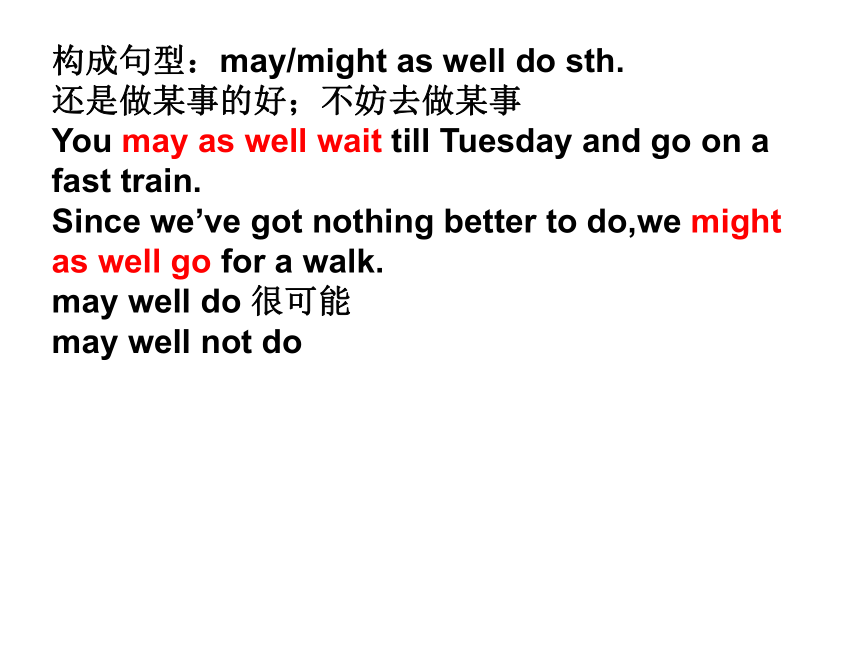
|
|
| 格式 | rar | ||
| 文件大小 | 52.5KB | ||
| 资源类型 | 教案 | ||
| 版本资源 | 人教版(新课程标准) | ||
| 科目 | 英语 | ||
| 更新时间 | 2010-03-16 00:00:00 | ||
图片预览

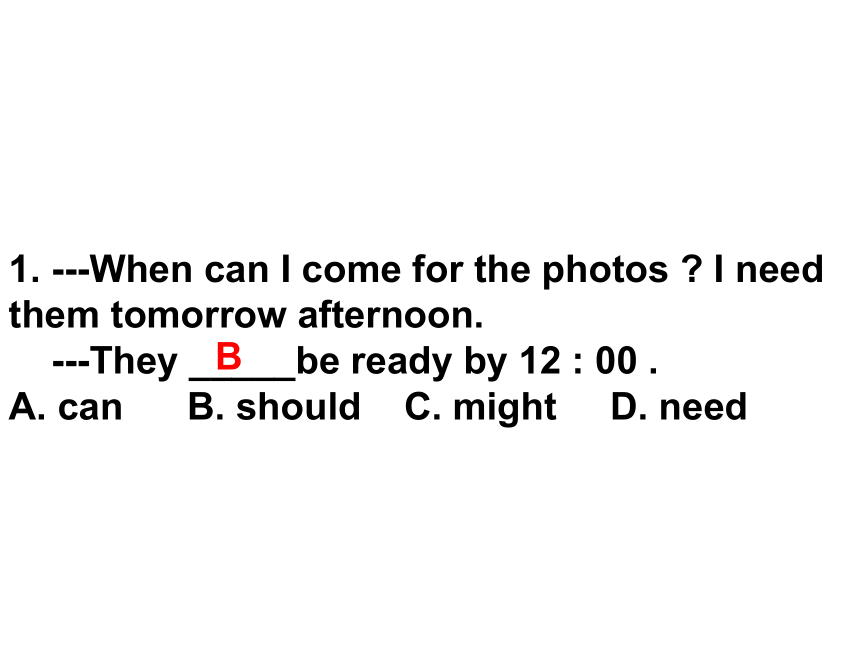
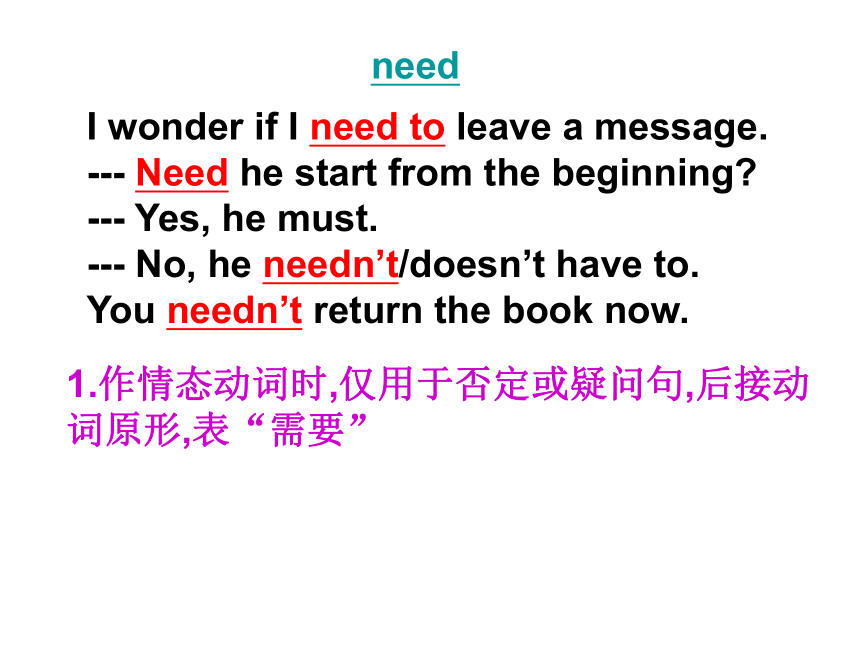

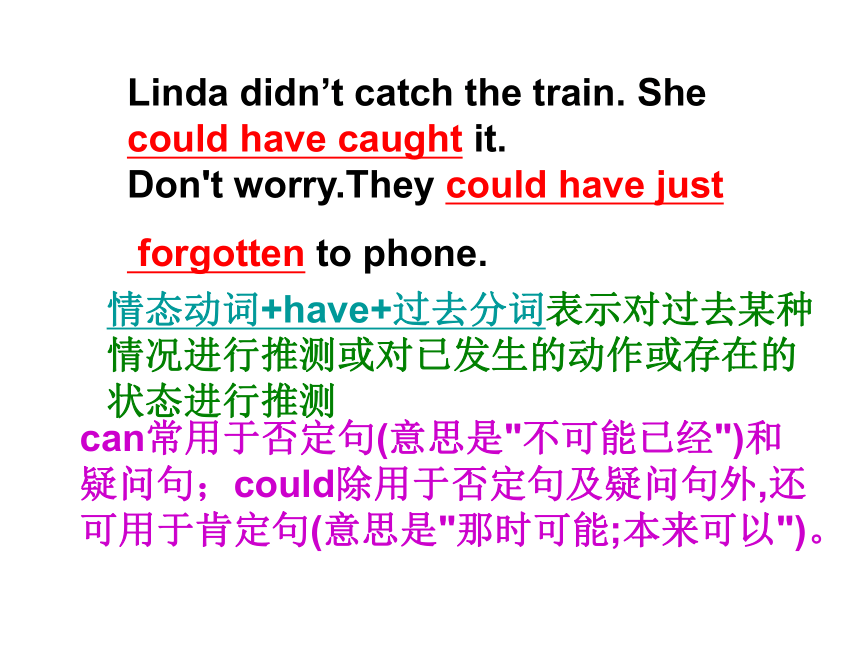
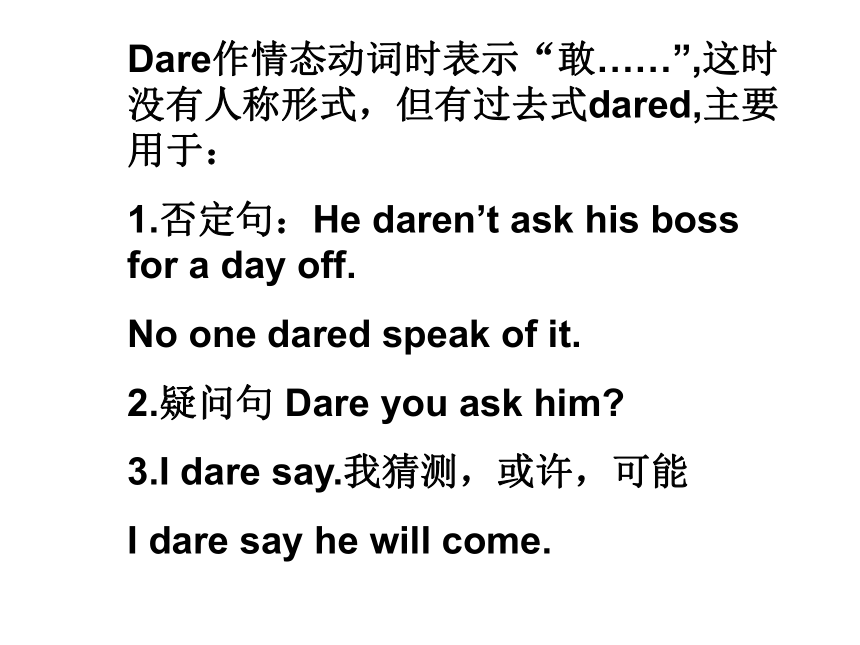
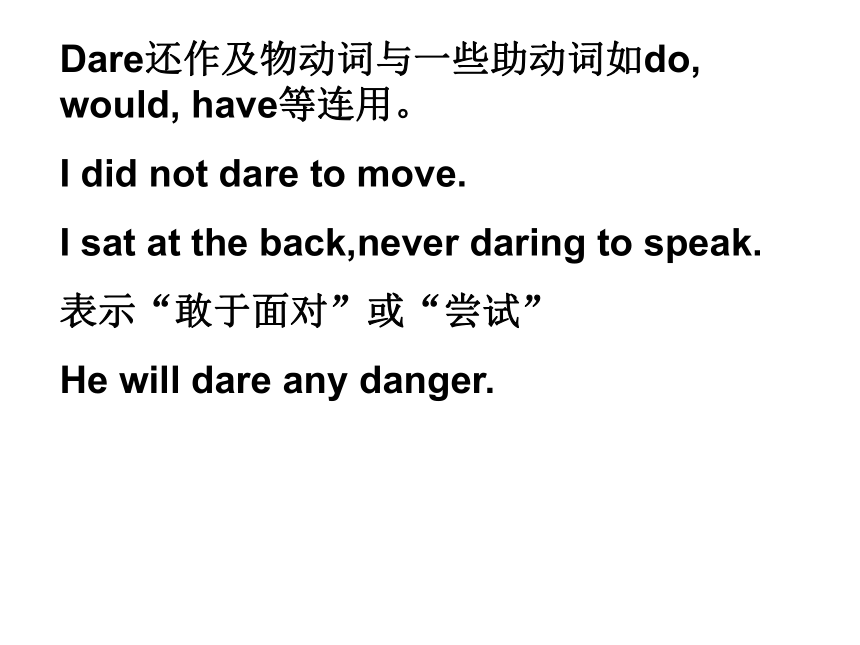
文档简介
课件16张PPT。构成句型:may/might as well do sth.
还是做某事的好;不妨去做某事 You may as well wait till Tuesday and go on a fast train. Since we’ve got nothing better to do,we might as well go for a walk.
may well do 很可能
may well not do 1. ---When can I come for the photos ? I need them tomorrow afternoon.
---They _____be ready by 12 : 00 . A. can B. should C. might D. needBneedI wonder if I need to leave a message. --- Need he start from the beginning? --- Yes, he must. --- No, he needn’t/doesn’t have to. You needn’t return the book now.1.作情态动词时,仅用于否定或疑问句,后接动词原形,表“需要”Our color TV set is still good enough. You needn’t have bought a new one.2.needn’t have done 表示做了本不必要做的事情,意为“本不必要…”He needs to finish it this evening. The classroom needs cleaning.3.Need作实义动词时,表示“需要”,有人称、时态、和数的变化Linda didn’t catch the train. She could have caught it. Don't?worry.They?could?have?just
?forgotten?to?phone. 情态动词+have+过去分词表示对过去某种情况进行推测或对已发生的动作或存在的状态进行推测 can常用于否定句(意思是"不可能已经")和疑问句;could除用于否定句及疑问句外,还可用于肯定句(意思是"那时可能;本来可以")。 Dare作情态动词时表示“敢……”,这时没有人称形式,但有过去式dared,主要用于:
1.否定句:He daren’t ask his boss for a day off.
No one dared speak of it.
2.疑问句 Dare you ask him?
3.I dare say.我猜测,或许,可能
I dare say he will come.Dare还作及物动词与一些助动词如do, would, have等连用。
I did not dare to move.
I sat at the back,never daring to speak.
表示“敢于面对”或“尝试”
He will dare any danger.比较have?to和must I don’t like this TV set. We must buy a new one. There was no more bus. They had to walk home.1.表示“必须”这个意思时,must?和have?to?稍有区别。must着重说明主观看法,have?to?强调客观需要。另外,have?to?能用于更多时态。 ?— Must?I?finish?all?assignments?at?a?time? ??—Yes, you must./No,?you?needn't/don’t have to. You?mustn’t?get?down?while?the?car?is?still? moving. 2.Must用于一般问句中,肯定回答用must否定式用?do?not?need?to或need?not做?“不必”,mustn’t表示“禁止,不允许” ?You?must?be?the?new?teacher. ? He?must?be?joking. There?is?nobody?here.?They?must?have?all ?gone?home. ?3.must表示对某人某事的猜测,?作“准是”,“一定” ,一般用于肯定句中。对过去发生的事情作肯定判断用must have done He must come and worry her with question, just when she was busy cooking the dinner. Of course,after I gave her my advice,she must go and do the opposite。4. Must表示“偏要,硬要”,指做令人不快的事情You must go home now,needn‘t you?(表必须,用needn’t) you mustn‘t walk on grass,must you?(表禁止,用must) you must be a teacher,aren’t you?(表对现在动作或状态的推测,用相应的现在时) It must have rained last night,didn‘t it?(陈述部分有表过去的状语时,用didn’t) she must have lived here for ages,hasn‘t she?(有时间段时,用hasn’t 或haven‘t)He must know the plan, doesn’t he?He must be doing his homework, isn’t he ?
1.Johnny, you ______play with the knife, you ____hurt yourself. ( )
A. won't ; can't B. mustn't ; may
C. shouldn't ; must D. can't ; wouldn'tB2.There is no light in the dormitory. They must have gone to the lecture, _____? ( ) A. didn’t they B. don’t they C. mustn’t they D. haven’t theyD3. I missed the bus, so I ___ go home on foot. A. must B. may C. can D. had toDShe may/might have gone to the cinema. They may/might not have received our telephone.3.对过去发生的事情的可能性作出判断用may/might have done,用might比用may的可能性更小 May you succeed! May?God?bless?you! 4.may?放在句首祈使句,表示祝愿。 Young people should learn how to use computers. Every citizen ought to obey law. You ought not to go.3. shoould常表示劝告、建议、命令,与ought to意义相近,但ought to多表示责任、义务,语气强烈。You should/ought to have told her the truth earlier. She shouldn’t have left without saying a word.4.should/ought to have done表示责备或批评,意为“本应该…但”,ought to的语气更强烈,用于否定则表示“本不该…但”They left at 5:30. They should get there now.5.Should用于可能性推测时,表“应该,很可能” 注意: must not 的意思是不许可,不应该或者禁止。
如:We mustn’t waste our time. ---- May I take this magazine out? ---- No, you mustn’t.
must 用于一般疑问句的时候,肯定回答应该用yes, please 或者 I’m afraid so, 其否定回答应该用 needn’t 或者 don’t have to。如:
还是做某事的好;不妨去做某事 You may as well wait till Tuesday and go on a fast train. Since we’ve got nothing better to do,we might as well go for a walk.
may well do 很可能
may well not do 1. ---When can I come for the photos ? I need them tomorrow afternoon.
---They _____be ready by 12 : 00 . A. can B. should C. might D. needBneedI wonder if I need to leave a message. --- Need he start from the beginning? --- Yes, he must. --- No, he needn’t/doesn’t have to. You needn’t return the book now.1.作情态动词时,仅用于否定或疑问句,后接动词原形,表“需要”Our color TV set is still good enough. You needn’t have bought a new one.2.needn’t have done 表示做了本不必要做的事情,意为“本不必要…”He needs to finish it this evening. The classroom needs cleaning.3.Need作实义动词时,表示“需要”,有人称、时态、和数的变化Linda didn’t catch the train. She could have caught it. Don't?worry.They?could?have?just
?forgotten?to?phone. 情态动词+have+过去分词表示对过去某种情况进行推测或对已发生的动作或存在的状态进行推测 can常用于否定句(意思是"不可能已经")和疑问句;could除用于否定句及疑问句外,还可用于肯定句(意思是"那时可能;本来可以")。 Dare作情态动词时表示“敢……”,这时没有人称形式,但有过去式dared,主要用于:
1.否定句:He daren’t ask his boss for a day off.
No one dared speak of it.
2.疑问句 Dare you ask him?
3.I dare say.我猜测,或许,可能
I dare say he will come.Dare还作及物动词与一些助动词如do, would, have等连用。
I did not dare to move.
I sat at the back,never daring to speak.
表示“敢于面对”或“尝试”
He will dare any danger.比较have?to和must I don’t like this TV set. We must buy a new one. There was no more bus. They had to walk home.1.表示“必须”这个意思时,must?和have?to?稍有区别。must着重说明主观看法,have?to?强调客观需要。另外,have?to?能用于更多时态。 ?— Must?I?finish?all?assignments?at?a?time? ??—Yes, you must./No,?you?needn't/don’t have to. You?mustn’t?get?down?while?the?car?is?still? moving. 2.Must用于一般问句中,肯定回答用must否定式用?do?not?need?to或need?not做?“不必”,mustn’t表示“禁止,不允许” ?You?must?be?the?new?teacher. ? He?must?be?joking. There?is?nobody?here.?They?must?have?all ?gone?home. ?3.must表示对某人某事的猜测,?作“准是”,“一定” ,一般用于肯定句中。对过去发生的事情作肯定判断用must have done He must come and worry her with question, just when she was busy cooking the dinner. Of course,after I gave her my advice,she must go and do the opposite。4. Must表示“偏要,硬要”,指做令人不快的事情You must go home now,needn‘t you?(表必须,用needn’t) you mustn‘t walk on grass,must you?(表禁止,用must) you must be a teacher,aren’t you?(表对现在动作或状态的推测,用相应的现在时) It must have rained last night,didn‘t it?(陈述部分有表过去的状语时,用didn’t) she must have lived here for ages,hasn‘t she?(有时间段时,用hasn’t 或haven‘t)He must know the plan, doesn’t he?He must be doing his homework, isn’t he ?
1.Johnny, you ______play with the knife, you ____hurt yourself. ( )
A. won't ; can't B. mustn't ; may
C. shouldn't ; must D. can't ; wouldn'tB2.There is no light in the dormitory. They must have gone to the lecture, _____? ( ) A. didn’t they B. don’t they C. mustn’t they D. haven’t theyD3. I missed the bus, so I ___ go home on foot. A. must B. may C. can D. had toDShe may/might have gone to the cinema. They may/might not have received our telephone.3.对过去发生的事情的可能性作出判断用may/might have done,用might比用may的可能性更小 May you succeed! May?God?bless?you! 4.may?放在句首祈使句,表示祝愿。 Young people should learn how to use computers. Every citizen ought to obey law. You ought not to go.3. shoould常表示劝告、建议、命令,与ought to意义相近,但ought to多表示责任、义务,语气强烈。You should/ought to have told her the truth earlier. She shouldn’t have left without saying a word.4.should/ought to have done表示责备或批评,意为“本应该…但”,ought to的语气更强烈,用于否定则表示“本不该…但”They left at 5:30. They should get there now.5.Should用于可能性推测时,表“应该,很可能” 注意: must not 的意思是不许可,不应该或者禁止。
如:We mustn’t waste our time. ---- May I take this magazine out? ---- No, you mustn’t.
must 用于一般疑问句的时候,肯定回答应该用yes, please 或者 I’m afraid so, 其否定回答应该用 needn’t 或者 don’t have to。如:
同课章节目录
